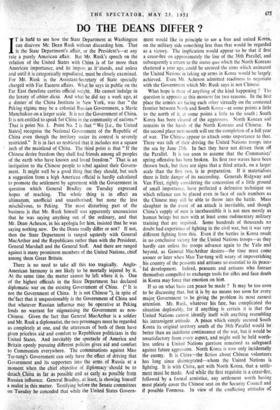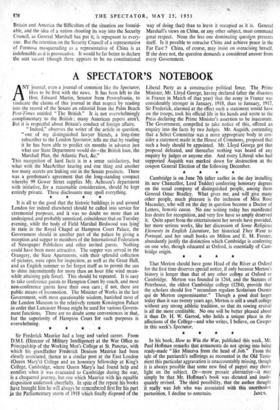_ DO THE DEANS DIFFER?
IT is bald to see how the State Department at Washington can disavow Mr. Dean Rusk without discarding him. That is the State Department's affair, or the President's—at any rate a purely American affair. But Mr. Rusk's speech on the relation of the United States with China is of far more than American importance, and its import as it'stands, and unless and until it is categorically repudiated, must be closely examined. For Mr. Rusk is the Assistant-Secretary of State specially charged with Far Eastern affairs. What he says in public on the Far East therefore carries official weight. He cannot indulge in the luxury of °biter dicta. And what he did say a week ago, at a dinner of the China Institute in New York, was that "the Peking regime may be a colonial Russian-Government, a Slavic Manchukuo on a larger scale. It is not .the Government of China. It is not entitled to speak for China in the community of nations." That is point No. 1. Point No. 2 is that "We [i.e., the United States] recognise the National Government of the Republic of China even though the territory under its control is severely restricted." It is in fact so restricted that it includes not a square inch of the mainland of China. The third point is that "If the Chinese desire freedom they shall find friends among all peoples of the earth who have known and loved freedom." That is an instigation to the Chinese people to rebel against their Govern- ment. It might well be a good thing that they should, but such a suggestion from a high American official is hardly calculated to promote the settlement by agreement with the Government in question which General Bradley on Tuesday expressed hopes of reaching. The whole thing is in effect an ultimatum, unofficial and unauthorised, but none the less mischievous, to Peking. The most disturbing part of the business is that Mr. Rusk himself was apparently unconscious that he was saying anything out of the ordinary, and that Mr. Dean Acheson, in his apologia for him, insisted that he was saying nothing new. Do the Deans really differ or not? If not, then the State Department is ranged squarely with General MacArthur and the Republicans rather than with the President, General Marshall and the General Staff. And there are ranged against it many prominent members of the United Nations, chief among them Great Britain.
There is no need to take all this too tragically. Anglo- American harmony is not likely to be mortally injured by it. At the same time. the matter cannot be left, where it is. One of the highest officials in the State Department has declared diplomatic war on the existing Government of China. (" It is not the Government of China. It is not Chinese "), in spite of the'fact that it unquestionably is the Government of China and that whatever Russian influence may be operative at Peking lends no warrant for stigmatising the Government as non- Chinese. Given the fact that General MacArthur is a soldier and Mr. Rusk a diplomatist, the two personages must be regarded as completely at one, and the utterances of both of them have given priceless aid and comfort to Republican politicians in the United States. And inevitably the spectacle of America and Britain openly pursuing different policies gives aid and comfort to Communists everywhere. The comrninations against Mao Tse-tung's Government can only have the effect of driving that Government and its supporters into the arms . of Russia at a moment when the chief objective of diplomacy /should be to detach China as far as possible and as early as possible from Russian influence. General Bradley, at least, is showing himself a realist in this matter. Testifying before the Senate committees on 'Tuesday he conceded that while the United States Govern- ment would like in principle to see a free and united Korea. on the military side something less than that would be regarded as a victory. The implication would appear -to be that if first a cease-fire on approximately the line of the 38th Parallel, and subsequently a return to the status quo which the North Koreans shattered a year ago, could be secured the aims which animated the United Nations in taking up arms in Korea would be largely, achieved. Even Mr. Acheson admitted readiness to negotiate with the Government which Mr: Rusk says is not Chinese.
What hope is there of anything of the kind happening ? The question is apposite at this moment for two reasons. In the first place the armies are facing each other virtually on the contested frontier between North and-South Korea—at some points a little to the north of it, at some points a little to the south ; South Korea has been cleared of the aggressors. North Korean soil remains in the hands of the North Koreans and Chinese. In the second place next month will see the completion of a full year of war. The Chinese appear to attach some importance to that. There was talk of their driving the United Nations troops into the sea by June 25th. In fact they have not driven them off the Parallel. It is too soon to assume that the Communists' spring offensive has been broken. Its first two waves have been thrown back, but there are signs that a third attack, on a larger scale than the first two, is in preparation. If it materialises there is little danger of its succeeding. Generals Ridgway and Van Fleet, rightly considering the concession of a little ground of small importance, have perfected a defensive technique on which reliance can be placed even in face of such numbers as the Chinese may still be able to throw into the battle. Mass slaughter in the event of an attack is inevitable, and though China's supply of men is inexhaustible it is not men merely as human beings but men with at least some rudimentary military training that are required. Some hundreds of thousands no doubt had experience of fighting in the civil war, but it was very different fighting from this. Even if the battles in Korea result in no conclusive victory for the ,,,United Nations troops—as they hardly can unless the troops advance again to the Yalu and beyond, as General MacArthur desires—the time must come sooner or later when Mao Tse-tung will weary of impoverishing his country of the peasants and artisans so essential to its peace- ful development. Indeed, peasants and artisans who foresee themselves compelled to exchange tools for rifles and face death in Korea may force that emotion on hint.
If so on what basis can peace be made ? It may be too soon to be discussing that, but it is by no means too soon for every major, Government to be giving the problem its most earnest attention. Mr. Rusk, whatever his fate, has complicated the situation deplorably, for if anything is certain it is that the United Nations cannot identify itself with anything resembling his intransigent attitude. A peace which simply secured South Korea its original territory south of the 38th Parallel would be' better than an indefinite continuance of the war, but it would be unsatisfactory from every aspect, and might well be held worth- less unless a United Nations garrison remained as safeguard against future aggression. North Korea is now only incidentally the enemy. It is China—the fiction about Chinese volunteers has long since disintegrated—whom the United Nations is fighting. It is with China, not with North Korea, that a settle- ment must be made. And while the first requisite is a cease-fire, followed by a formal armistice, any settlement worth having must plainly cover the Chinese seat on the Security Council and if possible Formosa. In view of the conflicting attitudes a Britain and America the tifficulties of the situation are formid- able, and the idea of a nation shooting its way into the Security Council, as General Marshall has put it, is repugnant to every- one. But the retention on the Security Council of a representative of Formosa masquerading as a representative of China is as indefensible as it is provocative. It would be far better to declare the scat vacant (though there appears to be no constitutional way of doing that) than to leave it occupied as it is. General Marshall's views on China, or any other subject, must command great respect. None the less one dominating question presents itself. Is it possible to ostracise China and achieve peace in the Far East ? China, of course, may insist on ostracising herself. If she does not, the question demands a considered answer from every Government.



































 Previous page
Previous page